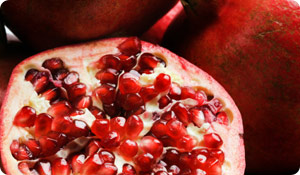
It’s difficult and messy to eat. Its juice can stain your clothes or countertops. But these are minor nuisances to put up with so you can reap the benefits of the pomegranate fruit. A native fruit of the Middle East, it’s becoming increasingly popular in North America since gaining superfood status.
In recent years it’s been touted more for its cancer-fighting and cardiovascular benefits. But several studies also suggest that chemicals in the pomegranate can help fight the symptoms of and reduce the damage caused by arthritis.
In one study published in the Journal of Inflammation, researchers at Case Western Reserve University gave a pomegranate extract equal to about 175 ml of pomegranate juice to rabbits.
They found that the extract significantly inhibited the activity of inflammatory proteins and the production of inflammatory compounds produced by cartilage cells. The rabbits’ blood also had much higher levels of antioxidants, which play a role in lowering inflammation.
In another study published in the Journal of Nutrition researchers investigated the effects of a pomegranate extract on Interleukin-1b (IL-1b), a protein that plays a key role in osteoarthritis. IL-1b can stimulate the overproduction of inflammatory molecules involved in cell and tissue production and growth. When you have osteoarthritis, too many of these molecules can damage your cartilage and joints.
The researchers added a pomegranate extract to a culture of human cartilage cells. They discovered that the extract could protect cartilage by preventing the overproduction of the inflammatory molecules in the cartilage cells.
Although more research is needed to show how pomegranate can fight rheumatoid arthritis and osteoarthritis in humans, these studies provide another ray of hope on the alternative medicine front. Many of the mainstream drugs used to treat inflammation and joint damage in arthritis can have serious side effects; alternative treatments, such as a pomegranate extract, provide safer ways to treat the disease.
Side Effects of Pomegranate
You’ve heard it before: Just because something is natural, doesn’t mean it’s safe. Under ordinary circumstances, pomegranate is very safe to eat. However, according to the University of Maryland Medical Center (UMMC), the fruit can interact with some medications, including ACE inhibitors, other blood pressure medications, and statins. Speak to your doctor before you take pomegranate juice, extract or pills while taking medications.
How Much Pomegranate Should You Have?
The UMMC recommends four to six ounces per day of the juice (not the extract) for children. There is no set standard for adults, but eight to 12 ounces of the juice is generally considered safe. Pomegranate juice is safe if you’re pregnant, but not the extract.
If you take an extract, follow the instructions on the bottle unless your doctor advises otherwise. Don’t take pomegranate if you’re suffering from diarrhea.
How to Prep a Pomegranate
Getting to the goodness inside this fruit can be tricky. Here are a few ways to make it easier:
- Cut the pomegranate in half from the top down to the bottom. Cut each half into a quarter.
- Soak the fruit in a bowl of clean water for about five to seven minutes
- Use your fingers to separate the seeds from the rind.
- Remove the skin and rind and drain the water
- That’s it. Your pomegranate is ready to eat. Or, you can blend it with a few other ingredients, such as banana and blueberries, into a delicious shake.
Study References:
Journal: Journal of Inflammation, Volume 59
Study Date: June 2008
Study Name: Bioavailable Metabolites of Pomegranate (Punica granatum L) Fruit Extract Preferentially Inhibit COX2 Activity ex vivo and IL-1b-induced PGE2 Production in Articular Cartilage Chondrocytes in vitro.
Website: http://www.journal-inflammation.com/content/5/1/9
Author(s): Meenakshi Shukla, Kalpana Gupta, Zafar Rasheed, Khursheed A Khan and Tariq M Haqqi
Journal: The Journal of Nutrition, 135:2096-2102
Study date: September 2005
Study name: Punica granatum L. Extract Inhibits IL-1ß–Induced Expression of Matrix Metalloproteinases by Inhibiting the Activation of MAP Kinases and NF-{kappa}B in Human Chondrocytes In Vitro1
Website: http://jn.nutrition.org/cgi/content/full/135/9/2096
Author(s): Salahuddin Ahmed, Naizhen Wang, Bilal Bin Hafeez, Vinay K. Cheruvu and Tariq





